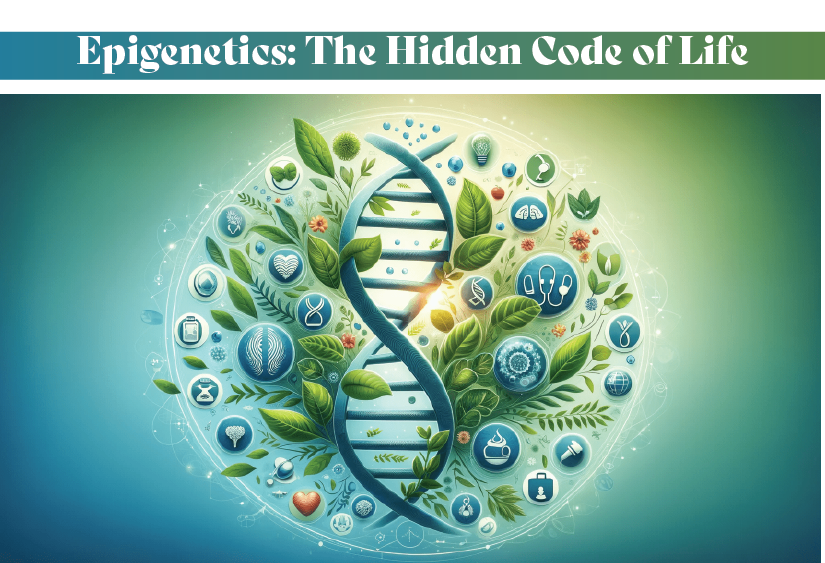
Article by
Imagine a situation when your lifestyle, actions, surroundings, and life events impact not just your own health but also that of your offspring and future generations. Greetings from the interesting field of epigenetics, where the complex combination of genes, environment, and destiny is revealed as the hidden code of life. Epigenetics is the study of gene expression, focusing on how environmental factors influence gene behavior without altering the DNA sequence itself. Think of it as a light switch; the DNA sequence is the wiring, but epigenetic changes flip the switch, turning genes on or off. Epigenetic modifications, such as DNA methylation and histone modification, create a unique code that determines which genes are expressed and when. This code is dynamic, changing in response to internal and external cues, including diet, stress, and exposure to toxins.
Recent groundbreaking research has demonstrated the possibility of transgenerational epigenetic inheritance, the ability to inherit altered epigenetic modifications. This implies that circumstances influencing your parents or grandparents can have an effect on your health as well as the health of your progeny. Epigenetics has far-reaching implications for our understanding of disease susceptibility, development, and treatment. By recognizing the role of epigenetic changes in disease, we can develop targeted therapies to reverse harmful epigenetic modifications, create personalized treatment plans based on individual epigenetic profiles, and understand how lifestyle choices impact gene expression and disease risk. During World War II, the Dutch population experienced a severe famine, known as the Dutch Hunger Winter.
Studies have shown that children born during this period had changes in their epigenetic markers, leading to increased risk of diseases like diabetes and schizophrenia. This demonstrates how environmental factors can shape gene expression and impact health. Epigenetic therapies, such as histone deacetylase inhibitors, have shown promise in treating certain types of cancer. These therapies work by reversing epigenetic changes that contribute to cancer development. A study on identical twins found that despite sharing the same DNA sequence, they had distinct epigenetic profiles.
This highlights the impact of environmental factors on gene expression. New technologies, such as CRISPR, allow for precise editing of epigenetic markers. This holds promise for treating diseases caused by epigenetic changes. Epigenetics will revolutionize many fields in the future. For example, epigenetic profiling will revolutionize personalized medicine by allowing customized therapies and treatments based on individual epigenetic signatures. Epigenetic therapies will also benefit cancer treatment by focusing on specific epigenetic modifications to prevent cancer from developing and progressing. Finally, epigenetic reprogramming will advance regenerative medicine by enabling the creation of induced pluripotent stem cells for tissue repair and regeneration. Epigenetic modification will also significantly improve agriculture by increasing crop yields, disease resistance, and nutritional value. Epigenetic techniques will be useful in synthetic biology as they will allow the creation of new biological circuits and pathways. Moreover, epigenetic studies will identify novel therapeutic targets for neurological conditions including Parkinson’s and Alzheimer’s.
Epigenetic research will also shed light on the effects of environmental pollutants on human development and health, contributing to a better understanding of environmental health. In the near future, expect increased use of epigenetic editing tools like CRISPR, development of epigenetic-based diagnostics and therapeutics, and integration of epigenetics into precision medicine and personalized healthcare. As research continues to advance, expanded knowledge of epigenetic mechanisms and their role in diseases will lead to innovative treatments and therapies. In the long term, anticipate epigenetic engineering of complex biological pathways, widespread application of epigenetic principles in agriculture and biotechnology, and potential breakthroughs in regenerative medicine and tissue engineering.
 Monthly "Azeem English Magazine", launched in 2000, records the information about diverse fields like mental health, literature, research, science, and art. The magazine's objective is to impart social, cultural, and literary values to society.
Monthly "Azeem English Magazine", launched in 2000, records the information about diverse fields like mental health, literature, research, science, and art. The magazine's objective is to impart social, cultural, and literary values to society.
+92 51 88 93 092
First Floor, RAS Arcade, Eidhi Market, Street#124, G-13/4, Islamabad, Pakistan, 44000.